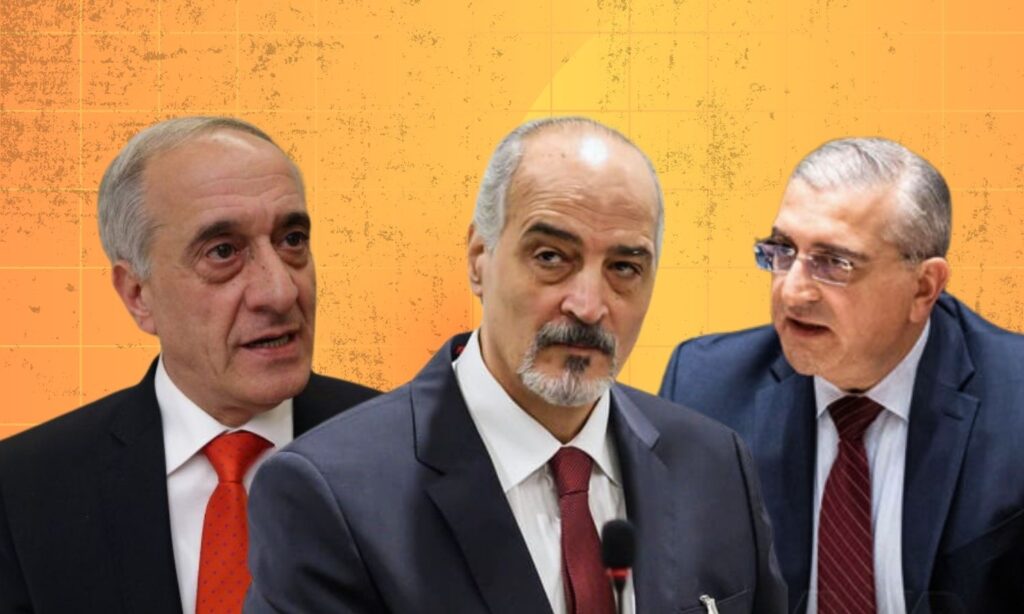Ambassadors appointed by Bashar al-Assad are still in office following the formation of a transitional government and the appointment of Ahmed al-Sharaa as the interim president of Syria.
Despite the presence of Assad’s ambassadors in various countries before his fall, with the exception of Qatar, which granted the Syrian embassy to the Syrian opposition (the current government) at the beginning of the revolution, some ambassadors were known for their fierce defense of the regime in international forums, as evident in their statements and political activities. Notably:
Bashar al-Jaafari
Bashar al-Jaafari remains Syria’s ambassador to Russia months after the fall of the regime, with a noticeable change in tone. Two weeks after al-Assad’s fall, he made his first official comment on the political changes in Syria.
In a meeting with Syrian expatriates in Russia, al-Jaafari stated that the call of the expatriates is to celebrate the change and the victory of the Syrian people’s will in overthrowing an era of oppression and the beginning of a new era that calls for optimism for a bright future, as he expressed.
After years of fiercely defending the Assad regime, al-Jaafari told expatriates that there was no regime in Syria, and if there had been one, it would have defended itself. He asserted that what existed was a corruption system that had subjugated the country’s interests to serve its personal ambitions, leading to the swift collapse of this system under such circumstances.
Bashar al-Jaafari served as Syria’s permanent representative to the United Nations from 2006 to 2020, attacking Syrian opposition factions and labeling them as “terrorist groups supported by foreign countries.”
He delivered scathing criticisms of Western countries, accusing them of practicing “political hypocrisy and supporting terrorism,” and defended the military operations of Bashar al-Assad’s regime and its Russian ally, claiming they were targeting “terrorists” in Syria.
In February 2021, Bashar al-Assad appointed al-Jaafari as deputy foreign minister, and in October 2022, he named him ambassador in Moscow.
Ayman Soussan
In December 2023, Bashar al-Assad appointed Ayman Soussan as ambassador to Saudi Arabia, after nearly a decade of serving as assistant foreign minister.
Although he became Assistant Foreign Minister in 2014 when Walid al-Muallem held the position, Ayman Soussan remained in al-Muallem’s shadow until 2018 when his media and political presence began to rise, coinciding with the minister’s absence from the screen during that period.
Soussan participated in discussions about relationships with Saudi Arabia, the Turkish rapprochement with the Syrian regime, its complicated trajectory, and the Astana talks that aimed for a political solution in Syria which never materialized. He carried al-Assad’s agenda and narrative during discussions at the international level.
After the fall of the regime, Soussan hurried to renounce al-Assad, asserting that remaining in his position and not defecting served the people more, without providing any explanation for this alleged service.
Qusay al-Dahhak
Since December 2023, Qusay al-Dahhak has been Syria’s permanent representative to the United Nations in New York, after serving as deputy ambassador from 2020 to 2023.
Days before Assad’s regime fell, at the height of the “Deterrence of Aggression” operation aimed at toppling al-Assad, al-Dahhak considered that Israeli airstrikes on Syria paved the way for attacks by “opposition factions.”
He stated that such an attack would not have been possible without a “joint Turkish-Israeli green light and operational order.”
During an emergency session of the UN Security Council convened on December 4, 2024, at the request of Assad’s regime, al-Dahhak claimed, “The magnitude and scope of the terrorist attack executed by these groups clearly illustrate the support provided by regional and international parties that found in terrorism a tool to implement their foreign policy and undermine the Syrian state, destabilize its security, and cause suffering for its people.”
A few days after the regime fell, al-Dahhak sent a letter to the UN Security Council, complaining of Israeli violations against Syrian territory, stating, “At a time when the Syrian Arab Republic is entering a new phase in its history, in which its people aspire to establish a state of freedom, equality, and the rule of law, and to achieve their hopes for prosperity and stability, the Israeli occupation forces have intruded into additional areas of Syrian territory in Mount Hermon and Quneitra governorate.”
On February 12, al-Dahhak called in a Security Council session for the complete lifting of American and European sanctions.

